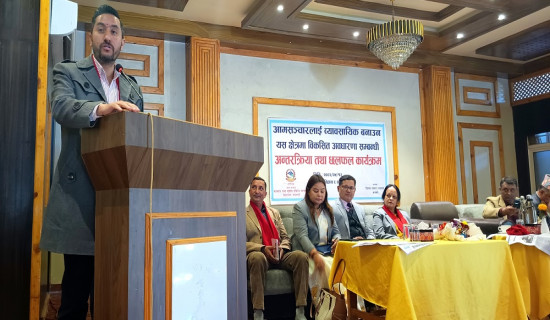- Sunday, 28 December 2025
Realistic Budget
Annual budget statement is a plan through which the government announces all its fiscal policies, the policy to tax and the spending. It is an economic as well as political document through which a government led by political parties tries to intervene the national economy through its fiscal policy in order to accomplish certain pre-determined socio-economic objectives of the nation. Fiscal policies are also used as instruments to stabilise various economic fluctuations that appear periodically. As fiscal policies directly affect the economic life of individuals and businesses, it is keenly observed and analysed by the people belonging to different sections of the society to make judgments towards the government and the ruling parties.
As per the constitutional provision, Finance Minister Dr. Prakash Saran Mahat announced the annual budget of Rs. 1751.31 billion for the fiscal year 2023/24 in a joint session of the parliament on Monday. The size of the budget is lower than the one introduced by then finance minister Janardan Sharma a year ago for current fiscal year 2022/23. The new budget aims to mobilise Rs. 1248.6 billion in revenue from internal sources and remaining resource of Rs. 452.75 has been proposed to manage from foreign grants and internal and external borrowings.
Unveiling the budget, Dr. Mahat said that the budget has focused on maintaining prosperity by building digital and green economy through the best use of resources. He further said that the budget has come to address the suggestions of the private sector and meet public expectations in order to instill hope in them. The budget has proposed to achieve the growth rate of 6 per cent by containing the inflation rate at 6.5 per cent in the next fiscal year.
At a time when the government is facing problems of low revenue mobilisation and low capital expenditure tendencies, the Finance Minister has introduced a down-sized budget lowering the proportion of capital expenditure on it. Moreover, various austerity measures have been proposed to overcome this problem of under-mobilisation of the government revenue. Such measures also aim at cutting the government expenses and making tax policy reforms to increase revenue mobilization. Similarly, in improving the expenditure capacity of the government mostly in regard to capital expenditure, the budget has been allocated to the projects in which preliminary works have already been completed. For this, the government has proposed several policy reforms in the budget.
Through the budget statement, the government has proposed programmes to boost the confidence of the private sector through various tax and non-tax policies. It aims to promote domestic production by encouraging youth entrepreneurs and private investments in different sectors of the national economy. Through the budget, the government has also made attempts to stabilise real estate and capital market transactions.
In nutshell, the budget introduced by the coalition government at a time when the economy and the government itself are facing a resource crunch has made significant attempts from the ground reality to address the problems and achieve goals of development and prosperity. But the only concern that remains is about its execution from the existing traditional administrative system.

















